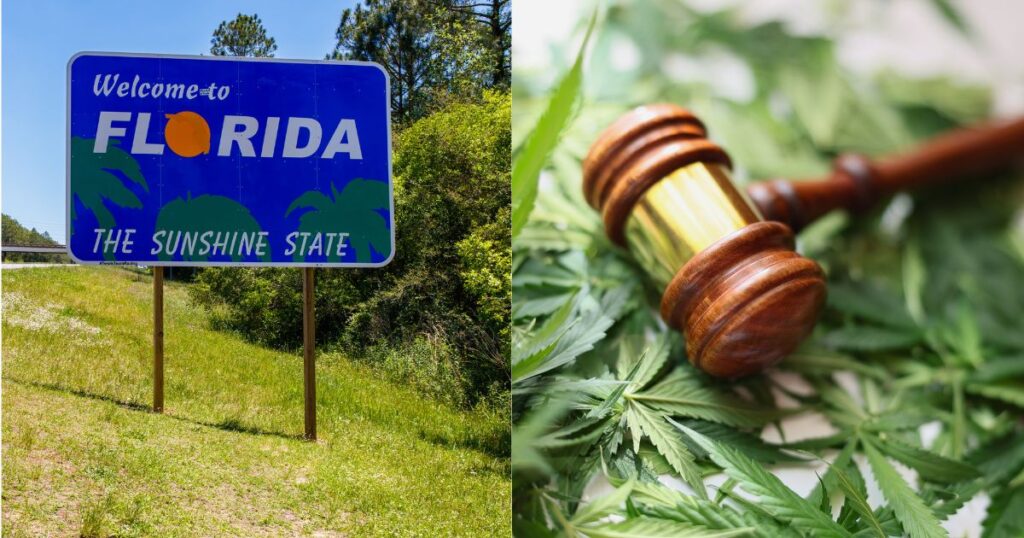Florida has once again failed to establish a comprehensive framework for regulating intoxicating hemp-derived products, leaving the issue unresolved for yet another year. This marks the third consecutive year where the state legislature has grappled with addressing the growing industry without producing actionable legislation. Despite heightened discussions and initial progress during the 2025 legislative session, disagreements between proposed bills in the Senate and House prevented anything from moving forward.
Debate Over Florida Hemp Regulations
At the heart of this ongoing debate is the rapid rise of hemp-derived THC products, including popular items like Delta-8 and Delta-10 THC, as well as newly trending hemp-infused beverages. These products, touted for their accessibility and versatility, have gained significant traction among consumers and businesses alike across the United States.
However, their popularity has also fueled what some say are concerns about public health, safety, and consumer protection, as federal legislation remains largely absent in this area. The 2018 U.S. Farm Bill legalized hemp and its derivatives, but the specifics of regulating hemp-derived intoxicating products have been left to individual states, and we’ve seen states ban these derivatives outright or impose legislation to limit them.
Florida legislators have also struggled to balance two competing priorities and have failed to compromise on regulations for this session, as first reported by the Florida Phoenix. On one hand, there is the call for stricter measures to ensure consumer safety and regulate potency, advertising, and testing. On the other hand, the state’s hemp industry, which is fairly large, includes farmers, retailers, and entrepreneurs, highlighting the need for business-friendly policies that would allow the hemp industry in Florida to thrive.
Clashing House and Senate Proposals
The legislative impasse stems from significant differences between two proposed bills. The Senate bill, (SB 438) spearheaded by Republican Senator Colleen Burton, took a stricter stance by seeking to ban synthetic cannabinoids like Delta-8 and limit hemp beverage sales to businesses with liquor licenses. The bill also proposed capping THC potency at five milligrams per serving for these beverages.
Meanwhile, in the House, a competing bill sponsored by Republican Representative Michelle Salzman (HB 7027) took a more moderate approach. Unlike its Senate counterpart, it did not ban Delta-8 products outright, nor did it impose liquor license requirements for hemp beverage sales. However, it did include a notable provision for a 15% excise tax on hemp products and proposed a higher THC potency limit of 10 milligrams per serving for beverages. While some in the hemp industry saw the House version as a better option, discrepancies between the two proposals proved insurmountable.
Industry and Consumer Perspectives
The lack of legislation provides both relief and frustration among key stakeholders on both sides of Florida’s hemp industry. For small businesses and retailers, the legislative stalemate means they can continue selling products like Delta-8 THC and hemp beverages without additional restrictions. However, the uncertainty surrounding future regulations creates an unstable environment for long-term business planning.
Carlos Hermida, owner of two hemp shops in Tampa Bay, expressed relief that proposed bans and restrictions on synthetic cannabinoids were not enacted this year. “If the Senate’s proposal passed, my livelihood would have been in jeopardy,” Hermida told the Florida Phoenix. “The uncertainty, though, makes it hard to grow the business sustainably.”
Consumers of hemp-derived THC products remain caught in the regulatory limbo as well. Advocates for stricter measures argue that a lack of oversight poses potential risks to public health. These include concerns about product labeling accuracy and the absence of consistent quality testing. The general public’s ability to safely consume these products hinges on effective regulatory frameworks, yet those measures remain elusive.
National Context of Hemp Regulations
Florida’s struggle is not unique, as other states grapple with similar issues. Georgia recently faced legislative hurdles in its attempts to address high THC dosages in hemp products. States like Idaho have opted to ban hemp-derived intoxicating products outright, while others continue to work toward regulating the industry in ways that balance safety and economic considerations.
According to Jonathan Miller, general counsel for the U.S. Hemp Roundtable, states are often engaged in a game of “whack-a-mole,” addressing new challenges as they arise. Miller notes that while progress toward regulation is incrementally being made, the complexity of the issue requires nuanced legislation that is difficult to develop and implement in a single session.
Disappointment from Advocates of Regulation
Proponents of regulation, including anti-drug advocacy groups, expressed dissatisfaction with the legislature’s inability to reach a consensus. Ellen Snelling of the Hillsborough County Anti-Drug Alliance lamented the missed opportunity to address these concerns, particularly given the time and effort invested in legislative workgroups tasked with exploring potential solutions.
“We need comprehensive regulation,” Snelling said, according to the Phoenix. “It’s frustrating to see this issue continually delayed when both consumer safety and public health are at stake.”
Despite this setback, lawmakers have indicated that the conversation is far from over. Representative Salzman reiterated that the House remains committed to finding a solution that protects consumers while supporting Florida’s farmers and businesses. However, with Florida lawmakers entering their fourth year of discussions without resolving the matter, skepticism continues to grow about whether they will meet at a point.
Florida’s failure to pass regulations of hemp-derived THC products just goes to show the complex interplay between safeguarding public health and fostering economic growth. Without a unified approach at the federal level, states like Florida are left to navigate these waters independently, often with conflicting interests pulling policy in opposing directions.
Looking forward, industry experts and lawmakers anticipate renewed efforts to revisit the matter during the next legislative session. It remains uncertain whether 2026 will mark a turning point for Florida’s approach to hemp regulation, but lawmakers have delayed addressing the issue once again.















